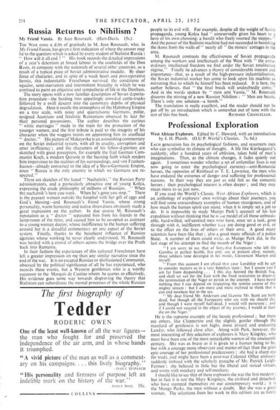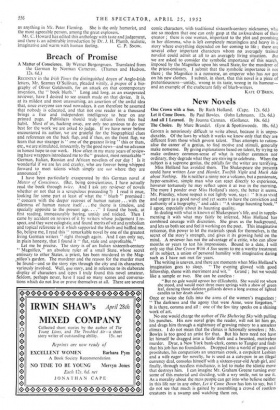Professional Exploration
EACH generation has its psychological fashions, and resurrects men who can symbolise its climate of thought. A life like Kierkegaard's suddenly, after a hundred years of oblivion, takes hold of men's imaginations. Then, as the climate changes, it fades quietly out again. I sometimes wonder whether a set of unfamiliar lives is not now going to enter the psychological currency—anti-Romantic heroes, the opposites of Rimbaud or T. E. Lawrence, the men who have endured the extremes of danger and suffering for professional reasons. In their way they are just as odd fish as the romantic heroes ; their psychological interest is often deeper ; and they may mean more to us just now.
If you read the World's Classic, West African Explorers, which is an anthology of explorers' own writings about their journeys, you will find some extraordinary examples of human strangeness, and of how much the human spirit can stand, when it is simply set a job to do. It is impossible to study Mungo Park's account of his last expedition without thinking that he is tile model of all those unbreak- able, hard-willed, self-centred men who have, once set a task, gone through with it, indifferent whether t:Ley are doing good or evil, or to the effect on the lives of others or their own. A good many scientists have been like that ; also a good many officials of a police State. A number of them could write, as Mungo Park did, in the last stage of his attempt to find the mouth of the Niger :
" I am sorry to say that of fort.)-five Europeans who left the Gambia in perfect health, five on') are at present alive, namely, three soldiers (one deranged in his mind), Lieutenant Martyn and myself.
From this account I am afraid that your Lordship will be apt to consider matters as in a very hopeless state ; but I assure you I am far from desponding ... I this day hoisted the British flag, and shall set sail for the East with the fixed resolution to discover the termination of the Niger or perish in the attempt. I have heard nothing that I can depend on respecting the remote course of this mighty stream : but I am more and more inclined to think that it can end nowhere but in the sea.
" My dear friend Mr. Anderson and likewise Mr. Scott are both dead, but though all the Europeans who are with me should die, and though I were myself half-dead, I would still persevere ; and if I could not succeed in the object of my journey, I would at least die on the Niger."
He is the supreme example of the heroic professional ; but there are others, like Clapperton and the slightly gentler (though the standard of gentleness is not high), more absurd and endearing Lander, who followed close after. Along with Park, however, the most interesting of this selection of explorers is Mary Kingsley, who must have been one of the most remarkable women of the nineteenth century. She was as brave as it is given to a human being to be, but with a courage more observant and matter-of-fact than the grim epic courage of her professional predecessors ; she had a sharp eye for trade, and might have been a post-war Colonial Office emissary suddenly imbued with the scholarly panache of Mr. Patrick Leigh- Fermor ; she believdd in little but the liberal and stoical virtues, and wrote with mockery and self-mockery.
I should like to say that of these explorers she was the first modern ; but in fact it is not the Mary Kingsleys, the civilised and detached, who have stamped themselves on our contemporary world ; it is the Mungo Parks, the men without a doubt. But she was a great woman. The selections from her work in this edition are as funny as anything in Mr. Peter Fleming. She is the only humorist, and the most agreeable person, among the great explorers.
Mr. C. Howard has edited this anthology with taste and judgement, and there is an admirable introduction by Dr. J. H. Plumb, realistic, imaginative and warm with human feeling. C. P. SNOW.



































 Previous page
Previous page